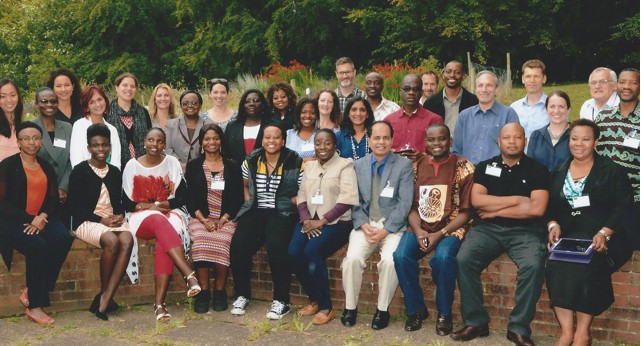
The fourth one week course on Transforming Nutrition jointly hosted by the Institute of Development Studies (UK) and the International Food Policy Research Institute attracted 25 participants from across Africa and Europe.
The three course convenors: Lawrence Haddad, Purnima Menon and Nick Nisbett, shared a series of presentations and discussions on the causes and consequences of malnutrition and the actions to overcome it. The course is based on the best evidence and helps participants think about strategies to overcome malnutrition in their contexts. We had great faculty to help us out: Stuart Gillespie, Richard Longhurst, Mdu Mbuya, Namukolo Covic, Jodie Harris, Inka Barnett, Dolf te Lintelo and guest presentations from Corinna Hawkes, Emily Mates (ENN), Jessie White and Susan Elden (DFID), with fabulous after dinner speeches from Richard Jolly and Simon Maxwell.
Some reflections:
- The cohorts coming through are getting more assured, confident and demanding about nutrition and what they want out of the course. In the first year or two participants were more tentative about what they could achieve in nutrition in their context, now the sense I get is that they know exactly what to do and they want advice on how to strategise about that and make it happen.
- The cohorts are getting more and more dominated by country leaders from government, UN agencies based in country and civil society. There were about 5 participants from development partners, and they provided a valuable perspective, but the 20 country based participants ran the show, and it was refreshing.
- We talked about overweight, obesity and nutrition related chronic diseases more than ever before. This probably reflects the presenters growing knowledge on the issues, but the discussions and questions were very focused on how to sequence action on undernutrition on top of all the other malnutrition issues manifesting themselves. These two worlds are slowly converging, and that is a good thing.
- The group presentations at the end of the week were simply amazing. The Nigeria team was large, determined, and impressive. The Tanzania team was small in numbers but very thoughtful. The Mozambique and Bangladesh teams innovated in their group presentations, using role play and film to communicate their problem, what they would do to overcome it and who they would influence to make it happen. The calibre of all participants was exceptional. I was struggling to keep up at times.
- I remain amazed at how few country or state level case studies there are of change. Why did stunting go down in this country? Why is wasting static? Why is overweight declining? Why is anaemia static? Why is exclusive breastfeeding rates going backward in country x? The nutrition journals currently disincentivise this kind of study, presumably because it is not methodologically pure enough. This is a real shame. Slicing and dicing research may help researchers get published, but who is going to weave all the strands back together again?
It is really gratifying to see how strong the demand for this course remains. We have had over 130 people go throughout the programme now. They have energised us and we hope we have energised them. We need all the energy going. The force may be with us in nutrition right now, but we (yes, you, reader) have to be the force to sustain it and turn it into action that reduces malnutrition. Nothing less will do.
This is a slightly edited version of a summary of the course by Professor Lawrence Haddad. The original article is available here.



